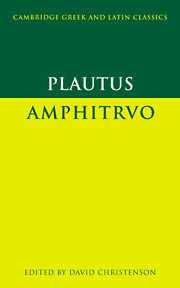Music, metre, and scansion
from Introduction
Published online by Cambridge University Press: 05 March 2013
Summary
Overview
There seem to have been three distinct modes of delivery in Roman comedy: spoken verse, recitative, and song, which we designate here by S, R, and C, respectively. Repeated sequences of (S)CR (Am. opens SCRCR, 1–462) and of SR unbroken by C (e.g. Am. 861–1053) were expected patterns, but Plautus’ plays show much variation. In accordance with established conventions, Am. commences in S, the metre of prologues, and ends in R (the final call for applause is invariably delivered in trochaic septenarii). Within the body of Am., R (usually the trochaic septenarius) is frequently used in scenes featuring lively and combative discourse between two characters (e.g. 263–462, 586–632, 654–860, 1009–fr. 6). And, as is also typical, examples of C in Am. coincide with the entrance of a character. The total number of songs in the play (five) is about average for Plautus; the percentage of spoken lines (27%) is slightly lower than is usual, but at least one scene in senarii falls within the lacuna. Beyond the conventions just noted, we cannot posit hard–and–fast rules regarding what kinds of situations and character–types tend to be associated with S, C, or R in Plautus, whose musical practice is fluid and flexible. Significantly in Am., the gods address the audience almost exclusively in spoken senarii. This no doubt is due to the prologizing function of these addresses, where the gods discuss both scenes enacted and scenes to come in an effort to control the audience’s reception of the play (463–98, 861–81, 974–83). Similarly, Jupiter, once his impersonation of Amphitryon is ended, explains the mysterious events one last time as deus ex machina in unaccompanied senarii (1131–43). Such instances demonstrate how the cessation of musical accompaniment might be used to seize the audience’s attention. Other cases are less straightforward.
- Type
- Chapter
- Information
- Plautus: Amphitruo , pp. 56 - 71Publisher: Cambridge University PressPrint publication year: 2000



